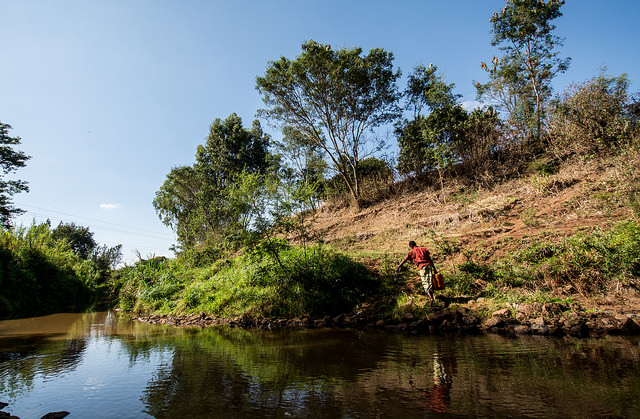The world faces growing problems—natural resource scarcity and climate change, along with anti-trade and migration movements—that require more nimble policies, institutions and investments for sustainable development. Yet, current approaches are hobbled because they operate in silos across sectors.
When stakeholders and policymakers operate in silos, maximizing one interest at the expense of everyone else’s, the result is often disaster. For example:
- From the 1950s onward, the Soviet Union expanded irrigation of cotton farms with water from Aral Sea tributaries for the sole purpose of economic growth. As a result, the sea virtually dried up, leading to irreversible impacts on local fauna and flora and toxic dust storms with substantial health impacts.
- More than 1 in 4 deaths of children under 5 years of age are attributable to unhealthy environments. Every year, environmental risks – such as indoor and outdoor air pollution, second-hand smoke, unsafe water, lack of sanitation, and inadequate hygiene – take the lives of 1.7 million children under 5 years, according to the World Health Organization. Despite the availability of a variety of solutions to address this challenge, the lack of coordination across health, development and environmental sectors has dramatically slowed progress.
There are, however, emerging opportunities for change. Unprecedented megatrends such as urbanization, migration, advances in technology, infrastructure development, and population growth are changing how we think about the world. The private sector has a unique opportunity to meet these challenges and partner with other sectors to shape the global future. We can only avoid more lakes drying up and people dying unnecessarily from pollution if we tear down silos and collaborate to meet shared goals.
It will take individual and collective action on the part of people, business, and policy makers to pursue more ambitious projects and ultimately to change how policies are made. We urgently need to incentivize changes in behavior at the individual, community and national levels. We must consider what is equitable and sustainable for both people and the planet. Without changes in attitude and behavior, human well-being will certainly decline, nature will not be able to sustain us, and economies will be undermined.
In July 2016 an effort was launched to help rethink how disciplines and sectors can better and more efficiently work together for shared impact. Called the Bridge Collaborative, and co-led by four key organizations—Duke University, PATH, the International Food Policy Research Institute (IFPRI), and The Nature Conservancy (TNC)—we are connecting the health, environment, and development communities to develop the evidence for results that support shared solutions to global challenges. The Collaborative includes scientists, practitioners, and policy makers working across communities around the world, guided by a high-profile Advisory Council.
The world is an intensely interconnected place, yet the methods used for collecting and evaluating evidence often end up missing the links. This effort is forging a common language, a community of practice across sectors, and a process for engagement that results in solving shared problems together. The Bridge Collaborative is sparking a transformation in how we see global problems, consider solutions, generate and use evidence, and measure success. Partnering with the private sector is critical to achieving this vision.
So far, the Bridge Collaborative has brought together leading experts to develop principles and process guidance for enabling cross-sector planning and implementation across a range of cases. We are rapidly moving toward action, forming partnerships among stakeholders in similar locations and across different sectors. They are trained to plan projects based on these cooperative principles and to track their own progress. By evaluating impact and outcomes through such collaborative planning and implementation, we will identify benefits not just for one sector, but for all of them.
We aim to work with existing initiatives and develop new ones. One such existing initiative is the Nairobi Water Fund, Africa’s first water public-private partnership. The Fund aims to provide a sustained supply to more than nine million people and generate $21.5 million in benefits to Kenyan citizens over 30 years. This will cut costs for hydropower and clean water, while addressing water flow and soil erosion issues in the upper Tana River basin. The Nairobi Water Fund is the brainchild of a consortium of private sector, NGOs, and research organizations with objectives that benefit the environment, development and health sectors. The Fund’s structure can support many more businesses, additional research, and development initiatives. Examples could include a sustainable wildlife reserve, an irrigation-nutrition program, linking high-value agricultural processors, or a vaccination project.
Through such efforts, we are accumulating evidence of the triple bottom line: Change with positive social, environmental and financial impacts. There are additional practical implications to this approach. By collaborating across disciplines, we can begin to think creatively about inter-sectoral job creation. We can anticipate risks to natural resources. Finally, we can get in front of potential regulatory problems that individual actors might not have considered. The overarching theme of global equity, empowerment, and sustainable development provides a grounding set of goals for all sectors as we strive toward transformational change—together.
Claudia Ringler is Deputy Division Director of IFPRI’s Environment and Production Technology Division; Lydia Olander directs the Ecosystem Services Program at the Nicholas Institute for Environmental Policy Solutions at Duke University; Katharine Kreis is the director of Strategic Initiatives, International Development, International Program Management at PATH; Heather Tallis is Global Managing Director and Lead Scientist for Strategy Innovation for The Nature Conservancy. This post, written in conjunction with the CGIAR Program on Water, Land, and Ecosystems and the recent Economist Sustainability Summit, first appeared on the Business Fights Poverty blog.







